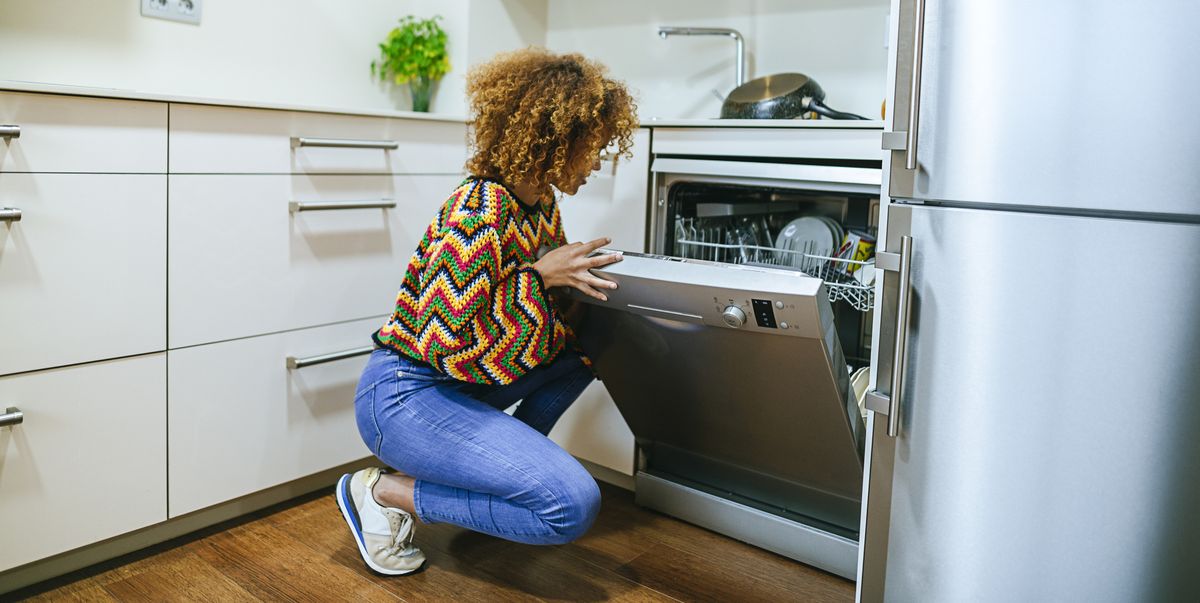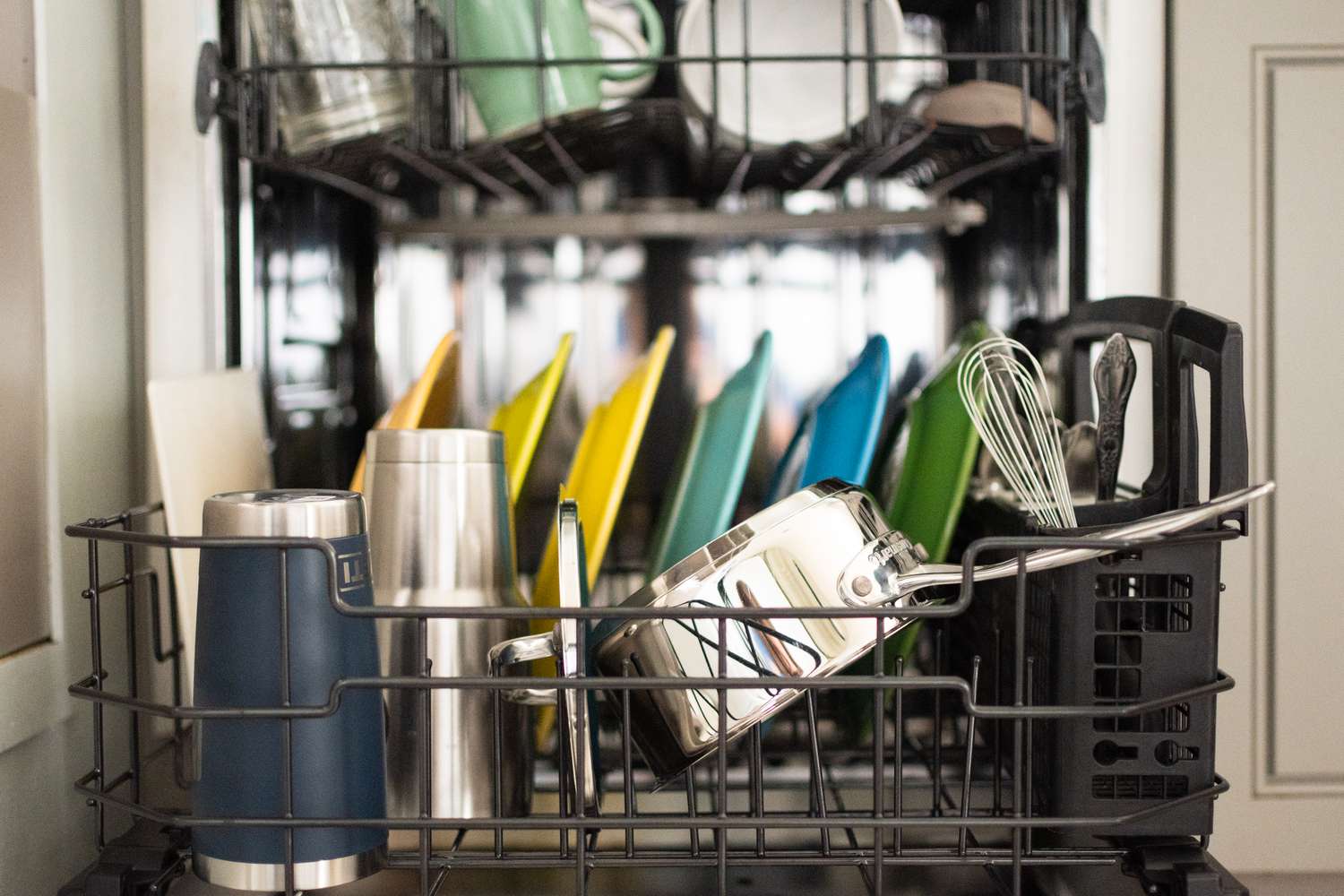A dishwasher is a staple appliance in modern kitchens, providing convenience and efficiency by handling the tedious task of cleaning dishes. However, when your trusted dishwasher starts falling short of delivering spotless results, it can be a frustrating experience.
This article is here to guide you through how to fix a dishwasher that's not cleaning dishes. Dull, grimy dishes that were supposed to emerge sparkling clean are enough to put a dent in the convenience factor. But fear not! Whether it's a matter of maintenance, simple adjustments, or a quick fix, we'll cover the essential steps to get your dishwasher back to its optimal cleaning performance.
Reasons Why Your Dishwasher Isn't Cleaning Dishes
When your dishwasher falls short of its cleaning duties, it can leave you with dirty and disappointing results. Several factors can contribute to this issue, and understanding these reasons can help you troubleshoot and fix the problem. Here are some common culprits behind a dishwasher that isn't effectively cleaning dishes:
- Clogged Spray Arms - The spray arms play a crucial role in distributing water throughout the dishwasher to clean the dishes. If they're clogged with debris or mineral buildup, water won't be able to reach all areas of the dishwasher, resulting in poor cleaning performance.
- Dirty or Blocked Filters - Dishwashers are equipped with filters that prevent food particles from clogging the pump and spray arms. If these filters are dirty or blocked, water circulation can be impeded, leading to inadequate cleaning.
- Insufficient Water Temperature - Dishwashers rely on hot water to effectively dissolve grease and food residue. If the water temperature is too low, it can lead to subpar cleaning results. Ensure that your dishwasher is connected to a hot water supply and that your water heater is set to an appropriate temperature.
- Improper Detergent Usage - Using the wrong type of detergent or not using enough detergent can result in poor cleaning. Refer to your dishwasher's manual for the recommended detergent type and quantity. Additionally, make sure the detergent dispenser isn't blocked by any objects.
- Incorrect Loading of Dishes - Improperly loading dishes can prevent water from reaching all surfaces, leading to uneven cleaning. Overloading the dishwasher or placing dishes in a way that obstructs the spray arms can hinder their ability to clean effectively.
- Malfunctioning Water Inlet Valve - The water inlet valve controls the flow of water into the dishwasher. If it's malfunctioning, there might not be enough water entering the dishwasher to clean the dishes thoroughly.
- Hard Water and Mineral Deposits - If you live in an area with hard water, mineral deposits can accumulate over time and affect the dishwasher's performance. These deposits can clog spray arms, filters, and other components, reducing their effectiveness.
- Worn Out Spray Arm Bearings - If the spray arm bearings are worn out, the spray arms might not rotate properly, leading to uneven water distribution and cleaning.
- Blocked Drainage - If the dishwasher's drainage system is clogged, it can lead to standing water at the bottom of the dishwasher, which can affect cleaning efficiency.
- Deteriorating Gasket or Door Seal - A damaged gasket or door seal can result in water leaking from the dishwasher, leading to reduced water pressure and cleaning performance.
By identifying and addressing these potential issues, you can often diagnose why your dishwasher isn't cleaning dishes as it should. Regular maintenance, proper loading practices, and troubleshooting can help you enjoy the full benefits of a clean and efficient dishwasher once again.
8 Ways To Fix Dishwashers That Don't Clean Well
A dishwasher that fails to clean your dishes effectively can be frustrating, leading to rewashing and wasted time. Fortunately, many common issues that cause poor cleaning can be resolved with some simple troubleshooting and maintenance. Here are eight ways to fix dishwashers that don't clean well:
Check And Clean The Spray Arms
Spray arms and distribute water to clean your dishes. Inspect them for clogs or blockages, and ensure they can spin freely. Remove the spray arms according to your dishwasher's manual, clean out debris, and clear any clogged spray holes with a toothpick or wire.
Clean The Filters
Filters prevent debris from entering the pump and spray arms. Regularly clean and maintain these filters to ensure optimal water flow. Remove the filters, rinse them under warm water, and scrub away any buildup with a soft brush.
Verify Water Temperature
Hot water is essential for effective cleaning. Check that your dishwasher is connected to a hot water supply and that the water heater is set to an appropriate temperature (around 120°F or 49°C) to ensure grease and residue are properly dissolved.
Use The Right Detergent
Make sure you're using the correct dishwasher detergent for your machine. Consult your dishwasher's manual for recommendations on detergent type and quantity. Using the right detergent can significantly impact cleaning performance.
Load Dishes Properly
Proper loading prevents dishes from blocking water circulation. Avoid overcrowding and ensure dishes aren't blocking the spray arms' movement. Face heavily soiled surfaces inward, allowing the spray arms to target them directly.
Inspect The Water Inlet Valve
A malfunctioning water inlet valve can reduce water flow, affecting cleaning performance. Turn off the dishwasher and water supply, locate the valve, and check for blockages. If necessary, clean or replace the valve.
Address Hard Water Buildup
Mineral deposits from hard water can accumulate in your dishwasher, hindering its effectiveness. Use a dishwasher cleaner or run an empty cycle with white vinegar to help dissolve these deposits and improve cleaning results.
Maintain Spray Arm Bearings
Worn-out spray arm bearings can hinder the proper rotation of the spray arms. Inspect the bearings for signs of damage or wear, and replace them if needed. This will help ensure even water distribution during cycles.
Why is my dishwasher not cleaning dishes and tablet not dissolving? FAQChatGPT
Why Is My Dishwasher Not Cleaning Dishes And Why Aren't Tablets Dissolving? - FAQ
Why Is My Dishwasher Not Cleaning Dishes Effectively?
Several factors can contribute to poor cleaning performance:
- Clogged Spray Arms -Debris and mineral buildup can obstruct water flow from the spray arms, leading to uneven cleaning.
- Dirty Filters - Filters that are clogged with food particles can hinder water circulation, resulting in inadequate cleaning.
- Low Water Temperature -Insufficiently hot water may not effectively dissolve grease and residue on dishes.
- Incorrect Detergent Usage -Using the wrong type or insufficient amount of detergent can result in poor cleaning.
- Improper Loading -Overloading the dishwasher or obstructing spray arm movement can prevent thorough cleaning.
Why Aren't Dishwasher Tablets Dissolving?
Undissolved dishwasher tablets can be frustrating. Here are potential reasons:
- Tablet Placement -Tablets might not dissolve if placed in a compartment that doesn't receive water during the cycle. Check your dishwasher's manual for proper tablet placement.
- Blocked Dispenser -Objects or detergent residue can block the dispenser, preventing tablets from dissolving properly.
- Spray Arm Obstruction -If spray arms can't rotate freely due to loading or debris, they might not direct water toward the dispenser.
- Water Flow Issues -Low water pressure or insufficient water entering the dishwasher can hinder tablet dissolution.
What Can I Do To Improve Cleaning And Tablet Dissolution?
Consider these steps to address both issues:
- Clean Spray Arms -Remove and clean spray arms, ensuring unobstructed spray holes and free rotation.
- Maintain Filters -Regularly clean filters to prevent clogs that impede water circulation.
- Check Water Temperature -Ensure your dishwasher is connected to a hot water supply with an appropriate temperature.
- Use Correct Detergent -Use dishwasher-specific detergent and follow dosage recommendations.
- Load Dishes Properly -Avoid overcrowding and blocking spray arms for even water distribution.
- Clean Dispenser -Remove any buildup or debris from the detergent dispenser.
- Inspect Spray Arm Movement -Make sure spray arms can rotate freely without obstruction.
- Check Water Inlet -Confirm proper water pressure and check for blockages in the water inlet valve.
- Address Hard Water -If you have hard water, consider using a dishwasher cleaner or white vinegar to remove mineral deposits.
What If These Solutions Don't Work?
If your dishwasher continues to exhibit poor cleaning or tablet dissolution, it might be best to contact a professional appliance repair service. They can diagnose and fix more complex issues, such as malfunctioning components or electrical problems.
Why Is My Dishwasher Leaving Residue On My Dishes? FAQ
Why Is My Dishwasher Leaving Residue On Dishes?
There are several factors that can contribute to residue buildup on your dishes:
- Hard Water Deposits -Minerals in hard water can leave behind white spots or film on dishes.
- Inadequate Water Circulation -Clogged spray arms or filters can prevent water from reaching all areas of your dishes.
- Excess Detergent -Using too much detergent can lead to a soapy residue on dishes.
- Old or Expired Detergent -Detergent that's past its prime might not effectively dissolve or clean dishes.
- Improper Loading -Overcrowding or incorrect placement of dishes can block water and detergent access.
- Blocked Spray Arm Holes -Spray arm holes that are obstructed prevent even water distribution.
How Can I Prevent Residue Buildup On Dishes?
To prevent residue from forming on your dishes, consider the following steps:
- Use Quality Detergent -Opt for high-quality dishwasher detergent and follow the manufacturer's dosage instructions.
- Maintain Filters and Spray Arms -Regularly clean filters and remove debris from spray arm holes to ensure proper water circulation.
- Pre-Rinse if Necessary -For heavily soiled dishes, a quick rinse before loading can help prevent residue.
- Load Dishes Properly -Avoid overcrowding and ensure dishes aren't blocking spray arm movement.
- Use Rinse Aid -Utilize a rinse aid to improve drying and prevent spotting and residue.
- Check Water Temperature -Ensure your dishwasher is connected to a hot water supply with the correct temperature setting.
- Regular Maintenance -Perform routine maintenance, such as cleaning filters and inspecting spray arms, to prevent buildup.
- Address Hard Water -If hard water is an issue, consider using a water softener or dishwasher cleaner.
What Can I Do If Residue Is Still Present After Trying These Solutions?
If you've followed the steps above and residue is still a problem, consider these additional actions:
- Switch Detergent Brands -Experiment with different dishwasher detergent brands to find one that works best for your water and dishwasher.
- Check Water Softener -If you have a water softener, ensure it's functioning properly to reduce mineral contentin the water.
- Consult Manufacturer -If the issue persists, consult your dishwasher's manufacturer or a professional technician for more specific guidance.
How Do I Deep Clean My Dishwasher? FAQ
Why Should I Deep Clean My Dishwasher?
Regular deep cleaning helps remove accumulated residue, mineral deposits, and debris that can affect your dishwasher's cleaning performance and overall hygiene. It also helps prevent unpleasant odors.
How Often Should I Deep Clean My Dishwasher?
Deep cleaning your dishwasher every 1-3 months, depending on usage and water hardness, is generally recommended to maintain optimal performance.
What Do I Need For Deep Cleaning?
You'll need white vinegar, baking soda, a soft brush or toothbrush, a microfiber cloth, and a dishwasher-safe container.
How Do I Deep Clean My Dishwasher?
Follow these steps for a thorough deep clean:
- Empty the dishwasher -Remove all dishes, racks, and utensil holders.
- Clean removable parts -Remove the racks and utensil holders and wash them with warm soapy water. Scrub any stubborn residue with a brush.
- Check the filter -Remove the filter and clean it under running water. Use a soft brush to remove debris.
- Clean spray arms - Check spray arm holes for clogs. Use a toothpick or wire to clear any blockages.
- Run vinegar cycle -Place a dishwasher-safe container filled with white vinegar on the top rack. Run a hot water cycle without any dishes. The vinegar helps dissolve mineral deposits and disinfect them.
- Baking soda scrub -Sprinkle baking soda along the bottom of the dishwasher. Run a short hot water cycle to help remove odors and stains.
- Wipe down interior -Use a damp microfiber cloth to wipe down the interior walls, door, and gasket.
- Clean seals and edges -Wipe around the door seals and edges with a cloth dipped in vinegar to remove any buildup.
- Clean exterior -Wipe down the exterior of the dishwasher with a damp cloth.
- Run a final rinse -Run a hot water cycle with no dishes to rinse away any remaining vinegar or baking soda.
- Replace parts -Put the removable parts back in place.
Can I Use Commercial Dishwasher Cleaners?
Yes, commercial dishwasher cleaners can be effective for deep cleaning. Follow the instructions on the product packaging.
How Can I Prevent Future Buildup?
To prevent buildup, rinse dishes before loading, regularly clean filters and spray arms, use quality detergent, and run an empty hot water cycle with vinegar once a month.
What If My Dishwasher Still Has Issues After Deep Cleaning?
If your dishwasher continues to have issues after deep cleaning, there may be underlying problems. Consider consulting the manufacturer's guide or contacting a professional technician for assistance.
People Also Ask
How Often Should I Clean My Dishwasher?
You should aim to deep clean your dishwasher every 1 to 3 months, depending on usage and water hardness. Regular maintenance tasks like cleaning filters can be done more frequently.
How Do I Remove Bad Smells From My Dishwasher?
To remove bad odors, place a cup of white vinegar on the top rack and run a hot water cycle. Baking soda can also help; sprinkle it along the bottom and run a short hot water cycle.
Can You Put Pans In The Dishwasher?
It's generally not recommended to put pans with nonstick coatings or cast iron pans in the dishwasher as the high heat and detergents can damage the coatings. Stainless steel and some enamel-coated pans are usually safe.
Is It Okay To Put Plastic In The Dishwasher?
Many dishwasher-safe plastics can be safely loaded into the dishwasher. However, be sure to check the manufacturer's recommendations on your plastic items to prevent warping or damage.
How Can I Fix A Dishwasher That's Not Draining?
If your dishwasher isn't draining, first check the drain filter and the drainage hose for clogs. Ensure the garbage disposal's knockout plug is removed if the dishwasher is connected to it. If issues persist, there may be a problem with the pump or drain valve that requires professional attention.
Conclusion
Your dishwasher, once a reliable ally in the kitchen, can sometimes encounter hiccups that hinder its cleaning prowess. By systematically working through the potential culprits, from clogged spray arms to misused detergents, you've taken charge of troubleshooting the problem. With the insights gained from this guide, you've tackled issues that might have been standing between you and sparkling dishes. Remember, routine maintenance and proper loading practices can go a long way in preventing future setbacks.
By investing a bit of time and effort, you've not only revived your dishwasher's performance but also empowered yourself with the know-how tokeep it running smoothly. So, enjoy the satisfaction of a job well done as you relish the sight of dishes that once again gleam with cleanliness, all thanks to your newfound expertise.


